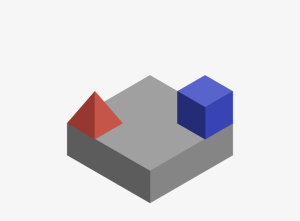View the official project page or try it out.
Isomer is an easy-to-use graphics library for drawing isometric scenes.
var Shape = Isomer.Shape;
var Point = Isomer.Point;
var Color = Isomer.Color;
var red = new Color(160, 60, 50);
var blue = new Color(50, 60, 160);
iso.add(Shape.Prism(Point.ORIGIN, 3, 3, 1));
iso.add(Shape.Pyramid(Point(0, 2, 1)), red);
iso.add(Shape.Prism(Point(2, 0, 1)), blue);To start using Isomer, you first need to include a small (7kb minified) script wherever you see fit:
<script src="/path/to/isomer.min.js"></script>After which you'll need to place a canvas in your document that we can later refer to. Be sure to give it a width and height!
<canvas width="800" height="600" id="art"></canvas>Note: To improve the look of your canvas on retina displays, declare the width and height of your canvas element as double how you want it to appear. Then style your canvas with CSS to include the original dimensions.
#art {
width: 400px;
height: 300px;
}At this point we can finally instantiate an Isomer object. Pass it a reference to your canvas like so:
var iso = new Isomer(document.getElementById("art"));And you're ready to start drawing!
To build the project, first install the dependencies.
$ npm install
$ npm install -g gulp
And then simply run:
$ gulp
[gulp] Using gulpfile /Users/jordan/Projects/isomer/gulpfile.js
[gulp] Starting 'build'...
[gulp] Finished 'build' after 6.47 ms
[gulp] Starting 'default'...
[gulp] Finished 'default' after 17 μs
To generate isomer.min.js in the build/ directory.
Install dependencies with:
$ npm install
test/index.html contains a basic testing page that draws various shapes. This page will load the unminified scripts.
For more info, check out the official project page.

